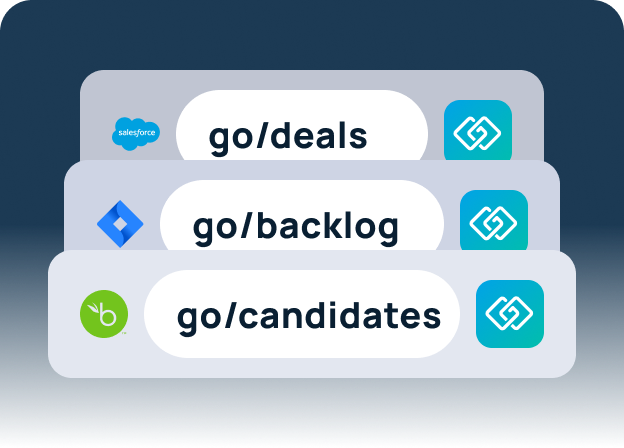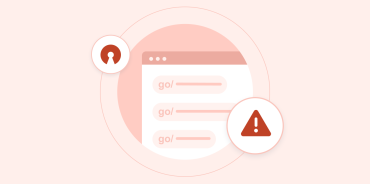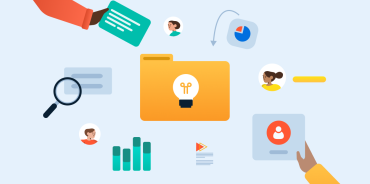When an employee leaves your company — whether through turnover or a layoff — you lose far more than the work they did each day. You also lose all of the institutional knowledge that they’ve accrued during their time at your company — 42% of which is entirely unique to them. So, when they go, their coworkers are left unable to do 42% of the job left behind.

Fortunately, generative artificial intelligence (AI) has emerged as a powerful way to help prevent this type of knowledge loss.
At this stage, chances are you’ve heard about generative AI. However, the technology is still so new that you may not have had a chance to witness firsthand how it can transform the way employees access, share, and grow knowledge at work.
Below, we’ll explore what generative AI is, how it works, and how it can help your organization improve productivity, save costs, and reduce knowledge loss. Let’s dive in.
What is Generative AI?
Generative AI is a type of machine learning that allows users to generate new, unique content based on pre-existing data. Generative AI can — true to its name — generate all kinds of content, from copy to images to music to videos.
You’ve likely already seen people on LinkedIn mentioning ChatGPT. This free chatbot can formulate answers to all sorts of prompts posed by users, from “Write a 5-page essay on robotics” to “Create a sales strategy to launch our new product to enterprise leaders.” Over on Instagram, you may have seen people sharing out-of-this-world portraits created (in mere minutes) by generative AI.
The buzz around generative AI is well-deserved: it has the potential to transform how we work. But to truly harness it, you should understand how generative AI tools work and how their talents can be applied in the workplace.
How does Generative AI work?
At this stage, AI has already been around for a while: you can see AI at work when you call a business and a robot walks you through several phone tree options, or when a chatbot on a website directs you to the right support article.
These types of AI systems, however, are generally rule-based. They’re programmed to return a certain answer or perform an action (such as dialing an extension) when the user selects an option (such as pressing “2” to book an appointment).
Generative AI models, however, are based on machine learning.
With machine learning models, AI tools are fed — and learn from — a massive amount of training data. For instance, a model might be told, “This is what a red car looks like,” and then fed millions of images of red cars (of all varieties and sizes). This is far more data than a human could process, but thanks to computer speeds today, an AI model could process it all in minutes. The model then detects patterns in the input data and uses those patterns to generate new (yet similar) outputs. Humans then provide feedback on the generated content output, helping the model continually fine-tune its results.
The benefits of Generative AI
There are countless benefits that generative AI can bring to the workplace — but let’s dive into just a few of the strongest reasons below.
1. Improved decision-making capabilities
First of all, since the models are trained on huge data sets, they’re often able to detect patterns that humans can’t. In fact, machine learning tools have already outpaced humans in a wide range of arenas, from recognizing images to reading lips.
But generative AI can also be useful since it takes emotions out of the equation. For instance, while a sales rep might make a forecast based on a hunch or biased past experiences, a sales forecasting AI tool will make its predictions based solely on data — which can make it far more accurate.
2. Cost savings through automation
When you add up the time that you spend at work doing routine tasks — such as sending emails, tracking down information, or inputting data — it ends up being… quite a bit of time. In fact, if a company added up the amount of money they could save through automation at work, they would be looking at cost savings of 40% to 75%.

3. Improved workplace efficiency and productivity
By automating certain tasks, generative AI can boost employee efficiency and productivity. In fact, according to a 2023 study that looked at the effects of implementing generative AI in the workplace, tech support agents who used AI saw an average 14% increase in productivity. (This boost was even more pronounced for novice workers, whose productivity increased by 35%.)

4. Reduced knowledge loss
AI helps prevent institutional knowledge loss by making it easier for employees to find, access, and share information. Not only can employees use generative AI to help document their knowledge, they can also use generative AI to search knowledge bases and workplace tools for information.
How to use Generative AI to prevent workplace knowledge loss
So, how can you use generative AI to prevent workplace knowledge loss? Easy: by using its immense power to automate the process of finding and disseminating workplace knowledge.
GoLinks is a tool designed to increase collaboration and productivity by making it easier for employees to access information company-wide. Using GoLinks, teams can find and share information using memorable short links called go links. For example:
- The HR team can use the go link “go/onboarding” to redirect to an onboarding manual in Google Drive
- The product team can use the go link “go/roadmap” to connect to a roadmap in Jira
- The marketing team can use the go link “go/requests” to link to a form in Trello
“You no longer have to ask HR for a link to your benefits platform — you can just guess intuitively that you’ll be able to find it at ‘go/benefits,’” explains Charlotte O’Donnelly, Sr. Product Marketing Manager at GoLinks. “These small daily asks for information add up to a lot of valuable time taken away from your teammates, and with GoLinks you get all this time back — 1000 hours a month in the case of some of our large clients.”
Now, we’ve made it even easier for employees to find the institutional knowledge they need by integrating ChatGPT into GoLinks’ search bar. Rather than having to intuit a certain go link or ask a coworker for a specific go link, users can now enter a prompt into GoLinks’ search bar and ChatGPT will offer relevant go links based on the go links’ names, descriptions, and content.
For instance, previously, a marketing manager might search for “customer quotes” and simply see a single, straightforward go link returned (“go/customer-quotes”). Now, however, ChatGPT can take that request, comb through an organization’s entire database of go links, and return several helpful options based on the go links’ descriptions and context. Here’s what that might look like in action:
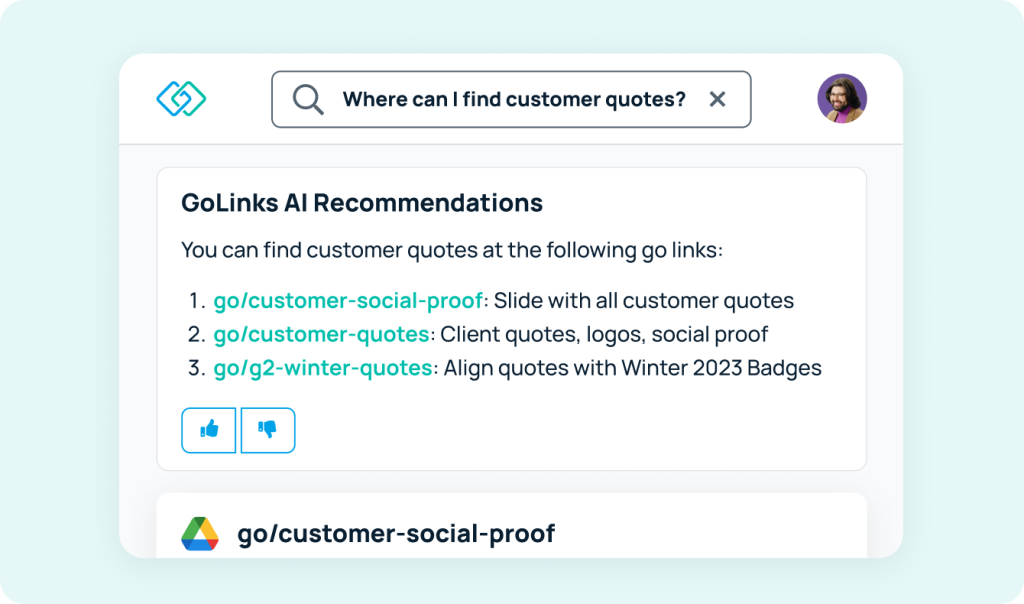
Similarly, a customer service rep might be searching for iOS resources for a customer. Using GoLinksGPT, they’d be able to find go links to the GoLinks iOS app, screenshot assets for the iOS App Store, iOS app analytics, guides and resources for GoLinks on iOS, and more.
GoLinks will also suggest new potential go links for users to create, making it easier for users to preserve and share their institutional knowledge.
GoLinksGPT can also be used in Slack, where users can simply tag in @GoLinks to answer questions or requests. GoLinksGPT will answer the query in the same conversational style that a coworker would — while still freeing up that coworker’s time, since they don’t need to be interrupted by a colleague’s request for information.
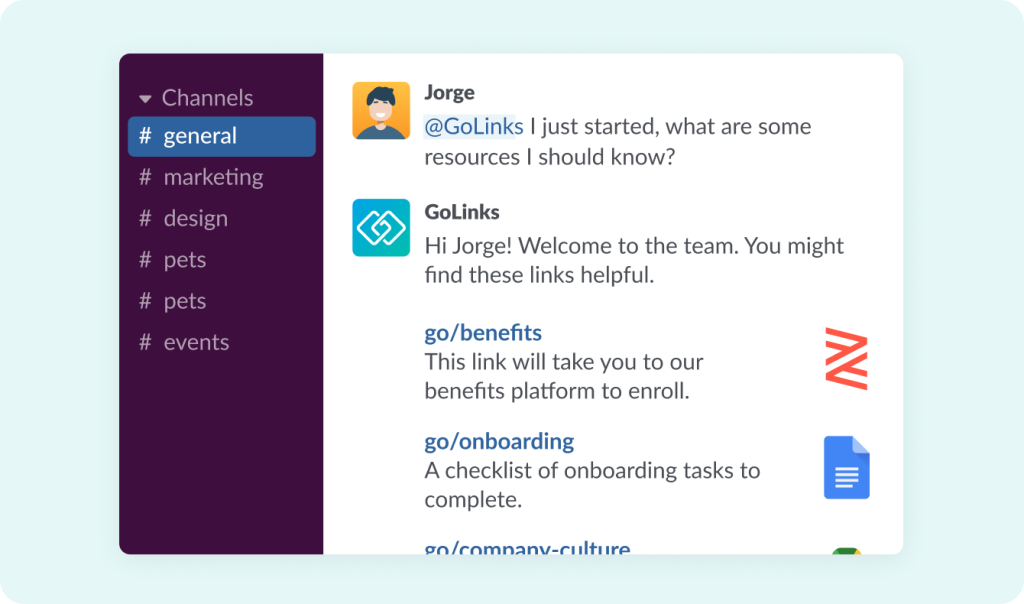
And if a go link doesn’t exist for a certain question, not to worry. GoLinksGPT will use ChatGPT to generate an answer to the question or request. If the user wanted to, they could then capture this same information and share it in a go link — making that same information accessible company-wide.
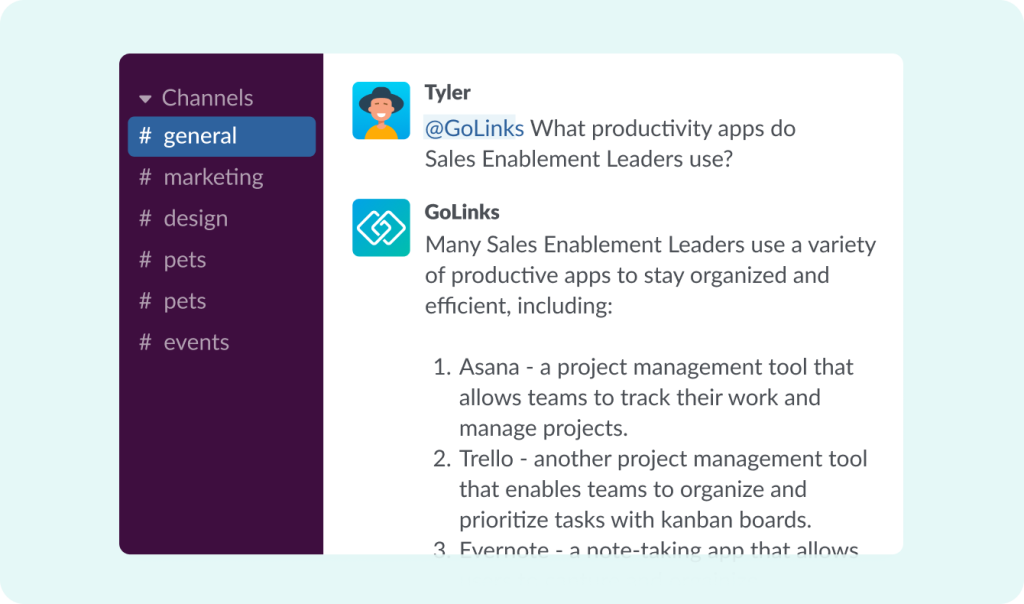
When you use a tool like GoLinks search powered by ChatGPT, workplace resources are findable even after someone leaves the company. Nothing gets lost, even if the person who originally created the go link has left.

Live Webinar: Maximizing Team Productivity with the Power of Generative AI
On August 17th at 11am PST, we’re bringing together a panel of tech experts to discuss the transformative potential of Generative AI and its role in revolutionizing company efficiency. Our speakers will discuss real-world examples and share valuable insights. Register now to secure your spot!

Make it easier to capture & preserve workplace knowledge
ChatGPT has been on the market for less than a year and has already rapidly transformed how organizations function. This transformation will likely continue to accelerate as the future of generative AI unfolds — and companies that embrace these advances will see their impacts on employee productivity, efficiency, and collaboration.
To explore how generative AI can help your employees better find, share, and access information, get started with a free trial of GoLinks.
Access and share resources instantly with GoLinks
Try for free